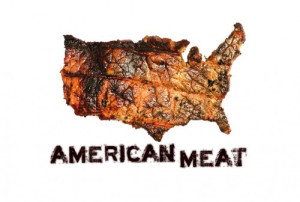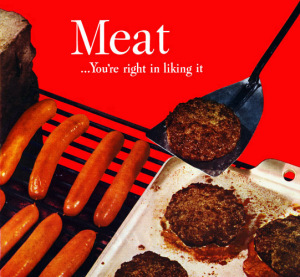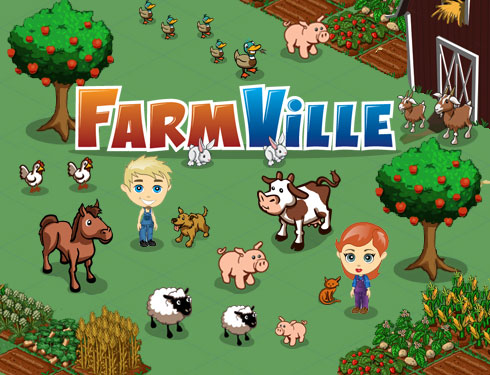American Meat (2010)
Directed by Graham Meriwether
http://www.americanmeatfilm.com/
Last night, in Saxapahaw, North Carolina, I had the pleasure of attending a ‘film and feast’ viewing of the documentary “American Meat”, a film that addresses the many concerns of conscientious meat eaters as well as those Americans who understandably question the ethics or environmental impact of the choice to eat meat. The purpose of this documentary is to highlight the struggles of the conventional meat farmer, and to provide insight into the alternative models being developed in order to revolutionize the meat industry in our country.

Pass the horseradish, will ya?
Though the title may give one the impression that they’re heading into a serious horror flick (or perhaps a tacky porno), this wonderful documentary was incredibly balanced and informative while still being touching and inspiring. This is not a film that uses hidden camera footage and disturbing imagery to portray the industrial animal farmer as an evil, soulless animal abuser who profits from the exploitation of innocent creatures. Rather, the film documents several real-life farmers who are working extremely hard, against the odds, to provide meat to the American public in a way that keeps their heads above water, from a financial standpoint. These men are certainly not in the business to make money; they have been farmers their whole lives, and love the work that they do. More importantly, these men love their animals.
One example is Chuck Wirtz, a conventional hog farmer from Iowa who loves his pigs, but recognizes that animals are intended to be our food. He cares about the pigs’ welfare, but cannot afford to change the inhumane production system that he works within. He has invested millions of dollars into his farming operation, and getting a return on that investment requires some level of stability that can only conventional farming methods can provide him. He has tried to move towards an organic, welfare compassionate production system, but he is having a hard time finding a stable buyer and can’t sell his pork as organic without a buying contract.
However, his attempts at a humane pork production have led him to change his personal eating habits. As he says in the film, “[I prefer to eat] the welfare compassionate pig… It’s more tender and has better flavor.”

I can haz meat?
After highlighting the struggles faced by the conventional American farmer, the director brings us to a more bucolic vision of a farm; Polyface Farm, run by the Lunatic Farmer himself, Joel Salatin. We are introduced to such concepts as the “Pigaerator” and the “Egg-Mobile”, both inventions of Joel’s that have revolutionized small scale animal production for many small farmers. As Joel puts it, “Good food production should be both aesthetically and aromatically pleasant. Our senses are for knowing what’s right and wrong.” Joel models his innovative farm around a deep understanding of ecologically appropriate agricultural techniques, and his return-to-nature philosophy has been adopted by many small farmers looking to improve the environmental sustainability and nutritional supremacy of their product.

Joel Salatin. Who else could make suspenders look so sexy?
I’ve personally visited Joel’s farm, and I agree that there is something absolutely beautiful about seeing his animals run around and live their lives the way nature intended them to. Joel celebrates “the pigness of the pig”, and allows his animals to express their natural tendencies. For example, in nature, birds follow behind large ruminants, so Joel uses this as a template and allows his chickens to follow behind the herds of cattle, to pick the insects out of their manure, greatly improving the nutritional benefits of their eggs. One of the most stunning images of the film, in my opinion, is the side-by-side comparison of a dull-yolked supermarket egg next to Joel’s beautiful, golden-orange egg yolk. Seeing such a stark difference in the product is enough to make anyone want to try an egg from an egg-mobile!

Which one would YOU rather eat?
I really appreciated that the director used no hidden camera footage of conventional farming; he wanted to show an honest picture of conventional farmers and their struggle to make ends meet and to feed our country. It’s important for us to recognize how hard farmers work, regardless of their choice of farming techniques.
However, the film goes on to explain how conventional farming is hurting our nation in a variety of ways. For example, conventional farming techniques require high levels of fossil fuels for growing corn and soy and turning it into feed for the animals. Also, the national distribution of farms, slaughterhouses, packing facilities, and grocery stores requires a great deal of fuel dependence. So even if the method was somewhat humane, the current large-scale model is not sustainable from an energetic perspective.
Furthermore, the conventional ‘vertically integrated system’ is not economically sustainable. Farmers don’t own the chickens they raise, and they’re constantly in competition with other farms around them to grow bigger, more productive flocks. Pilgrim’s Pride, for example, can cut off farmers at any time, and the enormous companies that own the animals have total control over farmers who have invested in the infrastructure to raise the chickens. This has led to the destruction of small agricultural towns as farmers are forced to either upscale or go out of business. Plus, conventional farmers only get about 8 cents of each dollar spent by consumers on meat, and often have to borrow lots of money to develop infrastructure for the conventional farming method, meaning they are constantly in debt to the banks or to the companies they have contracts with.
Another economic issue stemming from conventional farming methods is that commodity meat production is indirectly supported by our tax money. There’s a reason industrial meat is so inexpensive; 15 billion dollars of subsidies are provided to the current agricultural system, specifically to grow corn and soy to feed animals, which keeps cost of meat artificially low. Since many Americans can’t afford whole foods, and many are solely concerned with price when purchasing groceries, they often are forced to choose the cheaply produced (and nutritionally inferior) grain-fed meats.
However, when you realize that $112 per person per year worth of tax money goes towards commodities for industrial farming, it is clear there is a huge disparity in the way our tax money is benefiting certain agricultural practices. The film makes the point that the government needs to start supporting small scale farmers growing and distributing healthy produce and meat if we ever want this healthy, whole food to be accessible to the general public.
Would you like to save this post?
Your email address is 100% safe and will never be sent spam.
Another important point made by the film is that the average age of the American farmer is 57, which means we are facing a huge ‘human capital’ problem in the future. These alternative models of animal production are much more labor intensive, and if we want to feed America using grass based farms, we will need about 4 million people to start farming this way. There needs to be a huge influx of young farmers over the next few decades if we are ever going to conceivably be able to revolutionize the system by which we raise our food.

And no, playing Farmville doesn't count. Sorry.
While we are a long way away from reaching that number of new farmers in this country, the film did a wonderful job of highlighting the many young and even middle-aged farmers that are getting into the small farm business for a variety of personal reasons. One example is George Vojkovich, who became a grass-based farmer when he developed heart fibrillation caused by his nutritionally poor, chemical-filled diet. He decided that the only way to clean up his diet was to grow his food himself, and he regained his health by producing his own meat and dairy from grass-fed cows. The film profiles several different farmers doing small-scale animal production, and highlights their reasons for doing so, such as better health, greater life satisfaction, and overall concern for the welfare of their animals.
The film also demonstrated the variety of ways that small farmers are able to stay in business, through farmer’s markets, farm-to-table restaurants, buying clubs, and CSAs. Direct sales to customers allow the full food dollar to go to producers, and most small farms would not be in business without these direct sales. Additionally, buying clubs and CSAs help reduce the prices of fresh food, because it’s less risky than the unpredictable farmers markets and allows for cheaper prices. Farmers can get paid up front for expenses, which takes the risk out of producing and allows customers to enjoy supermarket level prices of high quality foods. Also, “knowing the farmer” allows consumers to feel safer about the food they eat, since their food is not provided through an anonymous, industrially-produced food system.
The film also featured the CEO of Chipotle, a ‘fast food’ restaurant which sources pork from sustainable, welfare compassionate, even locally sourced farms (in the case of Virginian Chipotles featuring Polyface pork), demonstrating that ‘fast food’ can still be healthy and sustainable if done the right way. This focus on the current positive actions being taken by corporations and small farmers gives the viewer hope that yes, we can truly have a better system for raising animals in this country.

Polyface Burritos for Everyone!
While the film highlights the struggles we are facing as a nation in our meat production methodology, such as economic instability, environmental damage, lack of human capital, and governmental support of a broken system, there is still hope for the future. The film ends on a rather touching note with the introduction of Richard Morris, a delivery driver for Polyface Farms. Richard left his corporate job when he realized how poor his quality of life was; he had asthma, high blood pressure, sleep apnea, joint pain, and was morbidly obese. He changed his diet first by eating clean meat and vegetables and drinking water, which made him decide to make a lifestyle change. He said to his wife, “let’s try eating like our grandparents ate. Just whole foods, nothing overly processed.” (sounds like a Paleo/Ancestral diet to me!)
Richard lost 160 pounds in 18 months, eliminated his poor health symptoms, got off medications, and generally gained true happiness by downsizing his life. In his spare time, he and his wife are turning their backyard into a farm to feed their family, and he is shown in the film with his wife pulling weeds in their lawn. He says “these weeds are a metaphor for the big screen TV, the McMansion, and the new car every year. Gotta pull ‘em up, throw them away, and plant something new. Raise something better.”
The film ended with Richard and his wife reminiscing about the journey they had taken to get to this point, which they wish they had started earlier but realize that they’ve done the best they can. Richard closes the film by saying “I guess you come to the party when you get there, and you dance while you can. So, we’re dancing.”
I nearly died. How sweet is he?

Richard, you melted my heart. Like hot butter.
In conclusion, this film was amazing. It was incredibly informative, even for a person like me who is constantly reading about sustainable agriculture and meat production, as I am an extremely conscientious carnivore. If you’re wondering how small grass based farms will ever compete with the massive scale of conventional techniques, I heartily recommend viewing this film, which addresses the many questions brought up in the intellectual choice to eat meat. It gave a new voice to conventional meat farmers, who work extremely hard for little money in order to put food on American’s tables. It highlighted the inspirational stories of the many farmers who are working just as hard to develop new, sustainable, alternative farming methods to produce clean, healthy meats at a reasonable cost, so that all Americans can afford to eat the way our ancestors did.
If you eat meat, and you care about the future of animal farming, you absolutely must see this film.
This post may contain affiliate links. If you click on a link and make a purchase, I may receive a small commission.
+ show Comments
- Hide Comments
add a comment